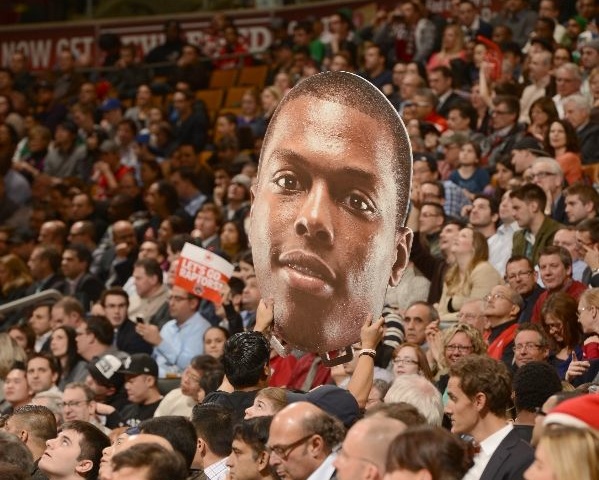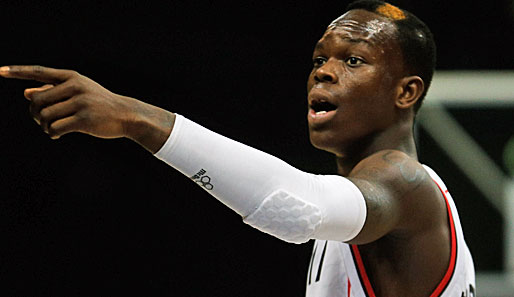Last July, the Raptors made a potentially franchise-altering trade that double as a statement on where management saw the team in it’s rebuilding path.
Kyle Lowry in. A future first round pick gone.
While Lowry was young-ish at 26, the sacrificing of a first round pick that was only top-three protected was a clear statement that the team expected to make the playoffs. Otherwise, why sacrifice a cost-controlled rookie asset (or potential trade chip) for what would then amount to one ‘meaningful’ year of Lowry, whose deal had just two seasons left at the time.
It also signaled the end of Jose Calderon’s tenure as the franchise’s sometimes-starter, sometimes-challenged, never-defeated point guard. Calderon would later be moved as part of the three-team trade that brought Rudy Gay to Toronto, a move that seems unlikely without the Lowry acquisition.
The Lowry deal also paved the way for another major move, as the Houston Rockets packaged that Raptor draft pick with other assets to pry James Harden from the Oklahoma City Thunder.
Nearly a year late, we now know that the pick dealt for Lowry will be the 12th overall selection in the 2013 NBA Draft. That pick, depending on where you look, is pegged to be Kelly Olynyk, Dennis Schroeder or Steven Adams. Plenty will change between now and the draft at the end of June, but we at least know what the compensation was in these deals.
So roughly 10 months later, I asked a Rockets and Thunder blogger to each update their take on the trade(s). My Raptors perspective follows.
—
The Deals
Trade 1
Raptors trade Gary Forbes and 2013 #12 pick for Kyle Lowry.
Trade 2
Rockets trade 2013 #12 pick (from TOR), 2013 #32 pick (from Cha, from OKC, from Bos), future top-20 protected 1st round pick (from Dal), Kevin Martin and Jeremy Lamb for James Harden, Cole Aldrich, Daequan Cook and Lazar Hayward.
The Rockets
Michael Pina, of Red 94, TrueHoop’s Houston Rockets blog:
Trade 1: It’s understated how important this trade was for Houston. If the Rockets never acquire that lottery pick from Toronto (which looked a lot more appetizing when the deal was made), they aren’t able to compile a package juicy enough to pry James Harden from the comforts of Oklahoma City.
Trade 2: Armchair quarterbacking a trade that occurred amidst so many questions, after many of those questions have been answered, can be obnoxious. But it’s just so tough to imagine the Thunder going through with this trade if they knew James Harden had top-10 talent, Serge Ibaka had a disappointing ceiling, the “lottery pick” from Toronto would actually be outside the top 10 in a shallow talent pool, and, getting extra snarky, Russell Westbrook would hurt his knee in the first round of the playoffs (which NEVER HAPPENS if the Thunder kept Harden, since it occurred against the very team Harden led to the playoffs).
The Thunder
Royce Young, of Daily Thunder, TrueHoop’s Oklahoma City Thunder blog.
Obviously the Thunder were hoping for better than No. 12 when they dealt Harden. And while it certainly diminishes OKC’s return for a true star even more, it’s far too early to judge the trade completely. We don’t know what Jeremy Lamb will be, and we don’t know what the player OKC picks will be. Right now it doesn’t look like the Thunder got enough for Harden. But we all might feel differently about that three years from now. Fans and media aren’t normally that patient, but the Thunder organization is.
—
The Raptors
The Raptors ended up dealing Gary Forbes and the 12th overall pick this year for Kyle Lowry. That is, unquestionably, a deal I’d make over and over again. Lowry had an up-and-down year and was quite polarizing for the fanbase, in part because of his tumultuous play and in part because he took the reigns from a man that would be sainted if Toronto were the Vatican.
Calling Lowry’s season anything but a bit disappointing would be too cheery. He certainly wasn’t terrible, but his per-36 scoring was down, as were his shooting percentages across the board. His rebounding and playmaking made small gains and his turnovers decreased, but his defense also didn’t match the reputation he came in with.
In fact, offensively I wasn’t too disappointed with the man formerly known as KLOE – he didn’t hit the expectations that were based on priced-in improvement, and he still exhibits an inability to score and facilitate at the same time. But his role changed dramatically twice during the season, once when he came off the bench after injury and again when Rudy Gay was acquired. You can understand inconsistency with changing parameters of play, and the final numbers were just fine. That consistency issue won’t be forgiven next year though with a (hopefully) more stable situation
Defensively, however, I was more disappointed. This article isn’t meant as a full evaluation of Lowry, but it warrants mentioning that the “bulldog” seemed far more often to be chasing cars than protecting the yard. That is, he’s a risk-taker, which is fine when you have strong help defenders behind you (only Amir Johnson probably counts in this regard) but can be harmful when teammates have to help beyond their comfort zone to account for your cheating. At times, Lowry’s defense was suffocating and created turnovers. Other times, his gambles left the Raptors without numbers or scrambling to recover. Like with his offense, finding consistency will be the key moving forward.
But this is about the trade, and it’d be tough to argue Lowry wasn’t and isn’t still worth a 12th overall pick. Based on Win Shares, he was worth roughly $10M this season. Win Shares are a sketchy stat to take at face value, but the fact that this “value” far outstrips his $5.75M salary confirms that he was a bargain. He’s only on the books for $6.2M this coming season, another discounted year in financial terms. As a refernce point, only four rookies in the past three years have ‘earned’ that dollar amount based on win shares.
The 12th overall pick might end up being a usable rotation piece. That’s entirely possible, and as Royce pointed out above, you can never fully evaluate a trade until much later. But it’s difficult to think of a scenario in which two discounted years of Lowry plus the opportunity to sign him to a longer deal (assuming he settles and the new GM likes him) wasn’t worth a maybe-a-rotation-guy pick. And if it turns out to be a stud in five years, you can’t really fault the team for not seeing it coming, otherwise that player would have went earlier, anyway.
It’s unfortunate that Lowry didn’t make the jump to elite point guard as some where hoping. He was 23rd among “guards” in win shares, eighth in assists per 36 minutes, fifth in rebounds per 36 minutes, 17th in PER and 35th in true shooting percentage. Those are strong rankings but not “irreplaceable,” making the incoming GM’s decision about the long-term point guard position a tough one, although not one he has to make immediately.
Kyle Lowry was a mild disappointment this year, sure. But if you take the positive signs he shows, price in some maturity and consistency with a more stable environment, and look at the names in the late lottery, it’s a very tough argument that the Raptors didn’t make out well here. The Rockets used that asset well, and credit to them for that, but this is one move Bryan Colangelo can’t be criticized for on his way out the door.



